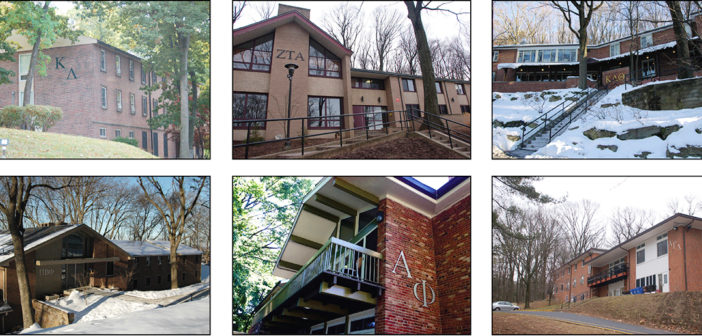Lehigh Greek life has undergone drastic changes in the last decade — since the 2010-2011 academic year, two sororities and 10 fraternities have been unrecognized by the university.
Past chapters include the Alpha Chi Omega sorority and the Kappa Alpha, Kappa Sigma, Omega Psi Phi, Pi Kappa Alpha and Sigma Chi fraternities, all unrecognized in the past four years.
“The tension between the administration and Greek chapters is pretty clear,” said Nina Alameno, ’21, a member of the Alpha Omicron Pi sorority.
Since she began studying at Lehigh in fall 2017, Alameno said she has seen multiple Greek chapters “kicked off of the hill.”
There are now 13 Interfraternity Greek Council chapters, eight Panhellenic chapters and three Cultural Greek Council chapters recognized by the school.
In spring 2011, 18 IFC chapters and eight Panhellenic chapters were recognized by the university.
Since then, two Panhellenic chapters were unrecognized, but Zeta Tau Alpha and Kappa Delta were introduced to campus in the 2011-2012 and 2013-2014 school years, respectively.
According to Fraternity and Sorority Statistics and Trends, IFC membership in 2010-2011 totaled to 1,003 students, Panhellenic membership totaled to 926 students and Cultural Greek Council membership totaled to 12 students.
In spring 2019, total IFC chapter membership came to 659 students, and Panhellenic chapter membership was 834 students. Cultural Greek Council membership was 14 students in spring 2019.
Although overall Greek life membership has decreased, Taylor Ingerman, ‘20, vice president of Greek relations on the Panhellenic executive board, said there have been positive changes over the last few years.
Ingerman said Greek chapters have recently become more involved with the larger Greek community.
“Chapters are more inclined and open to supporting other chapters at their events, especially philanthropy events,” she said.
Ingerman said she also sees increasingly strong turnout and enthusiastic participation by Greek life members in larger events such as Relay for Life, an annual fundraising event for the American Cancer Society. She is optimistic about the future of Greek life at Lehigh and hopes to see this involvement continue.
Thomas Bolte, ’21, a member of the Alpha Tau Omega fraternity, shares these hopes and noted there has been a nationwide shift away from detrimental hazing practices.
“I think there’s a mutual agreement between the fraternities and the administration that we want to keep kids safe,” he said.
He also reflected on the 10 Point Plan, a set of new rules and standards to be implemented next year for Lehigh’s Greek organizations.
The plan includes a ban on hard alcohol and more supervision and accountability for Greek houses and events.
“That’s something that our elected executives are weighing now, and in the future, we’ll have to see how much the administration comes into it, and what that middle ground will be,” he said.
Bolte’s chapter is interested in forming good relationships with the administration and coming to agreements that benefit everyone involved.
While Bolte understands the administration’s decisions to discipline fraternities for repeated infractions, he said there are many upsides to Greek life that aren’t always easy to see.
He explained when it comes time for accreditation, Greek chapters can only describe their concrete achievements and cannot report about other important aspects such as their strong friendships and support systems.
“There are little things that are hard to show to the community, but for the Greek members, it brings a lot more value than what we can put on paper,” Bolte said. “I hope that’s something that the administration can recognize in the future.”






Comment policy
Comments posted to The Brown and White website are reviewed by a moderator before being approved. Incendiary speech or harassing language, including comments targeted at individuals, may be deemed unacceptable and not published. Spam and other soliciting will also be declined.
The Brown and White also reserves the right to not publish entirely anonymous comments.
4 Comments
The accreditation process needs completely revamped as it is a useless bureaucratic process where unrealistic standards are imposed well beyond those required of any other student at Lehigh. It requires unreasonable administrative efforts falling on the backs of a handful of brothers.
The most significant change required for Greek life to sustain itself is when juniors & seniors stop moving off campus & start providing the leadership in the houses for the pledges & sophomores.
“I think there’s a mutual agreement between the fraternities and the administration that we want to keep kids safe, …” Duh!!
“The plan includes a ban on hard alcohol and more supervision and accountability for Greek houses and events.” Responsibility trumps the need for these three things.
I feel for the brothers and sisters whose fraternities and sororities no longer exist at Lehigh. It’s an unfortunate loss that should not have occured.
Such a shame. A systematic dismantling that was constructed by increasing requirements to remain recognized. The last one implemented, the requirement to fill 90% of your house or after 3 semesters you are booted. Totally ridiculous! The houses were built with large donations from alumni, usually in the 50% range, but from what I was told the university technically owned 51% to maintain control. The university should return the alumni’s investment or basically they have robbed the fraternity/sorority.
Agree with Mr. Haines. Houses need more experienced leadership living “in the house” in order to be aware of issues when the begin, not after damage has occurred. With all the bureaucratic requirements placed on Greek leaders for the accreditation process, having leaders living in the midst of the Sisters and Brothers is necessary, but few sophomores are going to be able to command that respect and authority.
Nick Noel ’74